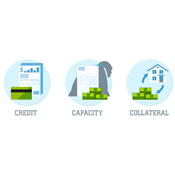What is PMI And How to Avoid It
Planning to put down less than 20% on your mortgage? You'll need Private Mortgage Insurance. Learn all about PMI and how to get rid of it below.
What Is PMI?
 |
| © CreditDonkey |
Private Mortgage or PMI protects lenders in the event that you, the buyer, cannot pay your mortgage.
When a buyer does not have the standard down payment for a home purchase, there is a higher risk of default and foreclosure.
PMI is required on:
- Private loans guaranteed by Fannie Mae and Freddie Mac that don't have at least a 20% down payment
- Mortgage refinances with less than 20% equity.
How Much Is PMI?
Mortgage insurance is part of your mortgage payment. Rates vary based on:
- Your credit score
- The amount borrowed
- Your lender's requirements
Generally, you can expect to pay .03% to 1.5% of the total loan amount for PMI.
What About FHA Loans?
Government loans, such as VA and FHA loans, are not private loans. While VA loans don't require mortgage insurance, FHA loans have their own Mortgage Insurance Protection (MIP).
You'll pay an up-front mortgage premium of 1.75% of the loan amount at closing. The mortgage insurance is then paid monthly.
Keep reading for more information on MIP.
How Long Does PMI Last?
PMI payments stay in effect until the loan reaches a balance of 80% Loan-to-Value (LTV).
It does not automatically cancel - you'll need to request the cancellation in writing. There are other requirements as well (more on those below).
Once 78% of the loan amount is reached, your lender must automatically cancel PMI, assuming have a good payment record and no other liens against the home.
By law, your lender must inform you at closing how long it will take to pay down the loan enough to cancel mortgage insurance. Some private loans require that PMI be carried for a specific length of time, regardless of the LTV.
This requirement is known as seasoning. It means many loans are not eligible for a refi for at least two years.
How Can PMI Be Canceled?
The Consumer Financial Protection Bureau requires that all requests to cancel PMI must be in writing. The mortgage service company must provide an annual statement showing who to contact to cancel your mortgage insurance.
You'll also need to:
- Obtain a new appraisal, showing the current value and demonstrating the loan-to-value ratio. Some mortgage lenders will accept a broker price opinion from a licensed sales agent instead.
- Be current on your payments: Lenders will not want to assume the risk of losing PMI if your payment history is spotty.
- Have a good payment historyThis means no late payments beyond 30 days during the previous 12 months AND no late payments beyond 60 days during the previous 24 months.
- Show no other liens on the home, including a home equity loan or a contractor's lien.
If you are a high-risk borrower, your lender may impose strict requirements for the cancelation of PMI. They might also require a higher loan-to-value ratio if the property is being rented out.
But look into refinancing costs first to ensure that you'll actually save money. You may wind up spending more in fees than you would for PMI until your loan is eligible for mortgage insurance cancellation.
If home prices are rising in the area, consider requesting a new appraisal to see if your loan-to-value ratio has dropped below 80%.
But make sure you meet the other criteria first, including owning the property for at least 2 years and having an LTV of at least 75%. (If you've owned the property for 5 years, you can cancel at 80%.)
FHA Loans
Mortgage Insurance Protection (MIP) is now required for the life of your FHA loan. But it wasn't always that way.
If you closed between July 1991 and December 2000:
You will have MIP for the life of the loan.
If you applied between January 2001 and June 2013:
You can remove MIP once the loan reaches 78% LTV based on the original value. You'll also need to show:
- No 30 day late payments in the past 12 months
- 5 years of having paid MIP
If you applied for an FHA loan after June 2013:
You can cancel if you've paid more than 10% after 11 years.
If you paid less, you will have MIP for the life of the loan. The only way to stop paying MIP then would be a refinance with a non-FHA loan product.
Bottom Line
Private Mortgage Insurance is a necessary part of life for many homeowners. But stay informed about your loan terms and options to avoid paying it longer than necessary.
Write to Janet M at feedback@creditdonkey.com. Follow us on Twitter and Facebook for our latest posts.
Read Next:






